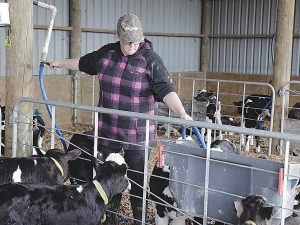DairyNZ Calls for Changes to Government’s Proposed Resource Management Act Reform
DairyNZ says the Government’s proposed Resource Management Act reform needs further work to ensure it delivers on its intent.
 Cambridge farmer Ashlea Kowalski believes strategies that reduce farmer injuries during the calving season are low cost and easily adopted.
Cambridge farmer Ashlea Kowalski believes strategies that reduce farmer injuries during the calving season are low cost and easily adopted.
Cambridge farmer Ashlea Kowalski believes strategies that reduce farmer injuries during the calving season are low cost and easily adopted.
Kowalski and husband Andy contract milk 245 cows and are using many of the strategies farmers recommended during a DairyNZ study that identified some simple ways farmers can reduce injuries on dairy farms.
“I work full-time and we don’t have any staff, so it’s really important we both stay well to keep the farm running,” says Kowalski.
“By piping milk to calves we can avoid lifting buckets and we’re able to feed 160 calves within 15 minutes. It’s a really efficient way of feeding. Our calf trailer is also a good height for us, and we have trolley jacks on our calfeteria to avoid heavy lifting.”
The couple have the milking area well-lit and keep hoses out of the way when not in use.
“It’s a good idea for farmers to get together with their farm team and assess what the risks are from calving and how to reduce these next season. Many safety strategies farmers can adopt are low cost, are easily adopted and are good for business as well,” she says.
The three-year DairyNZ project, funded in partnership with ACC’s Workplace Injury Prevention programme, is researching the causes of sprains and strains on dairy farms – and developing practical solutions to reduce injuries.
“Around 40% of injuries on dairy farms are sprains and strains, with the highest risk from August to October,” says DairyNZ senior scientist and research lead, Dr Callum Eastwood.
“As calving progresses, fatigue can set in and increase injuries,”
As part of the Reducing Sprains and Strains project, 370 farmers were surveyed on how they managed health and safety, and whether injuries had occurred.
“We know farm teams are working outdoors, in milking sheds, with animals and vehicles. The nature of their work means there is a risk of injury, particularly in busy times. Farmers reported injuries from lifting calves or buckets, from uneven ground and getting off motorbikes. In the milking shed, slippery surfaces and tripping on hoses are hazards,” says Eastwood.
Farmers surveyed used a range of strategies to avoid injury. These included sharing calf collection duties across the team, using a specialist trailer to transport calves, and piping milk into calf feeders rather than using buckets. Other tips included tucking hoses away in the shed and using footwear with a greater grip.
Virginia Burton-Konia, ACC manager - workplace safety, says farmers believe many injuries are avoidable.
“On average, the survey showed people who were injured needed 12 days off work, but took around 27 days to fully recover,” says Burton- Konia.
“With farms often short-staffed, new ideas to avoid injuries and make the job easier will ensure everyone can help out at the busiest time of year.”
The next stage of the project involves developing prototype options farmers can use to reduce injuries.
A calf pick-up trailer designed to reduce back strain is being developed for farmer feedback.
The project is part of work underway through a dairy sector strategy called Great Futures in Dairying to attract, retain and grow the dairy farm workforce over the next decade by developing great jobs, great people and great workplaces.
Budou are being picked now in Bridge Pā, the most intense and exciting time of the year for the Greencollar team – and the harvest of the finest eating grapes is weeks earlier than expected.
The Real Estate Institute of New Zealand (REINZ) has released its latest rural property report, providing a detailed view of New Zealand’s rural real estate market for the 12 months ending December 2025.
Rural retailer Farmlands has released it's latest round of half-year results, labeling it as evidence that its five-year strategy is delivering on financial performance and better value for members.
OPINION: "We are back to where we were a year ago," according to a leading banking analyst in the UK, referring to US president Donald Trump's latest imposition of a global 10% tariff on all exports into the US.
DairyNZ says the Government’s proposed Resource Management Act reform needs further work to ensure it delivers on its intent.
Overseas Trade Minister Todd McClay says he's working constructively with the Labour Party in the hope they will endorse the free trade agreement (FTA) with India when the agreement comes before Parliament for ratification.
OPINION: Expect the Indian free trade deal to feature strongly in the election campaign.
OPINION: One of the world's largest ice cream makers, Nestlé, is going cold on the viability of making the dessert.